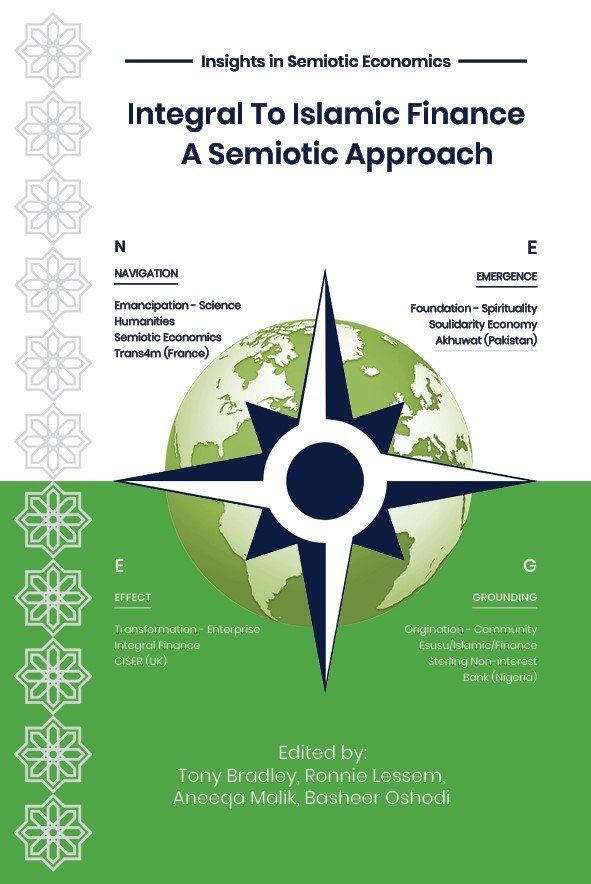Publications
Integral Finance -A Case Study of the Solidarity Economy
Book Review Integral Finance
A book that carries the term “finance” in its title could hardly bear fewer elements from the dominant finance literature than Integral Finance does and yet, from my point of view, is a source of legitimate pride for Akhuwat and the author. The author commences by trying to give a sense of her very motivation that roots back in her homeland, Pakistan, and describes her still existing characteristics linked to cultural and religious facets of Pakistani land even though she long ago migrated to the west. She thinks most of the worth to tell stories of her homeland goes untold and that she had the responsibility to make Akhuwat’s story known to the world.
Serhan Yildirim, Head of ALM & Capital Markets, Emlak Participation Bank
Integral To Islamic Finance:
A Semiotic Approach
In this book, Integral to Islamic Finance, we seek to re-position our understanding of money and accounting, placing the re-discovered-at least for the Western world-ancient system of ‘Islamic finance’ centre stage.
When we address questions of semiotics, it is significance, signification, sign,s and codes that are our primary concerns, which may sound highly abstruse. In fact, the signposts that alternative understandings of money generate, point to very different ways of running economies for societal benefit. So, in addressing the semiotic economics of money and finance, we are considering what alternative models of money point to.
What are they signs of? How do they demonstrate a different form of signification in society, which may indicate a radical and integral shift in the ways in which we view financial systems?
And so, to help us look in a new direction, we need to ask the basic question: what is the meaning of money? This, together with each of the other questions, is raised in this book.
ISBN Complete:978-1-912356-40-9

Integral Soulidarity Economy Manual:
A Handbook on Mawakhat
Integral Soulidarity Economy Manual" offers a transformative guide to reimagining our economic systems through the timeless wisdom of Islamic values and Prophetic teachings. Drawing on the concept of Soulidarity (spiritual brotherhood), this book provides a profound exploration of how economics can be rooted in mutual care, compassion, and community-based self-sufficiency.
With practical examples from Qard Hasan (benevolent loans) and Waqf (endowments), and case studies like the Akhuwat Foundation and Al-Mawakhat Microfinance, from Pakistan, Al-Mabrook from Canada, and the National Waqf Foundation from the UK. Malik presents an alternative to profit-driven capitalism—one that emphasizes ethical finance and the collective well-being of all people.
This manual is not just a call for economic reform, but a holistic approach that integrates spirituality, social justice, and human dignity into the fabric of our financial systems. Perfect for readers seeking an ethical, soulful, and sustainable alternative to modern economic practices, this book lays the foundation for an economy that serves the common good.
Buy Integral Soulidarity Economy Manual Downloadable PDF Version
Soulidarity with Universality:
The Call of the Time Spiritual Relationality as the Blueprint for Planetary Evolution
This article recounts my experiential engagement with the Call of the Time (COTT) dialogue, a collaborative initiative between the Brahma Kumari's (BK) and Minhaj University Lahore’s Shaykh-ul-Islam Spiritual Studies Centre (SISS), facilitated by the Department of Religion and Philosophy. Framed within Brahma Kumari's cyclical cosmology and SISS’s mission to synthesise Islamic spirituality with contemporary challenges, the event exemplified the potential of inter-spiritual dialogue to transcend sectarian boundaries within Pakistan as observed through the varied inter-faith participation.
The discussion is contextualised within contemporary challenges of social disconnection and the limitations of conventional interfaith dialogue in Pakistan, suggesting that a socio‐spiritual integration model rooted in relational engagement offers a promising path toward societal transformation.
Key themes include the dissolution of artificial binaries between inner transformation and social action, the amplification of spiritual relationality beyond interfaith paradigms, and the implications of such dialogues for fostering global solidarity.

